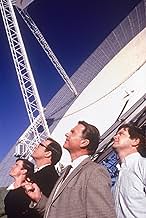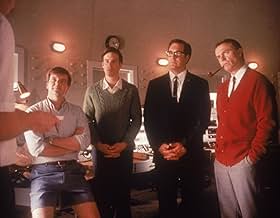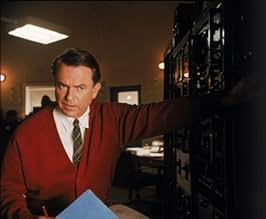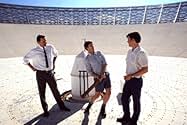IMDb रेटिंग
7.2/10
18 हज़ार
आपकी रेटिंग
अपनी भाषा में प्लॉट जोड़ेंA remote Australian community, populated by quirky characters, plays a key role in the first Apollo moon landing.A remote Australian community, populated by quirky characters, plays a key role in the first Apollo moon landing.A remote Australian community, populated by quirky characters, plays a key role in the first Apollo moon landing.
- पुरस्कार
- 3 जीत और कुल 10 नामांकन
Beverley Dunn
- Secretary v
- (वॉइस)
- …
फ़ीचर्ड समीक्षाएं
Once and a while a true surprise comes along. A film that is pleasantly surprising and enjoyable. Well, that's what "The Dish" is. It never takes itself too serious and never takes itself too lightly. It is just right.
It is centered around the true story of the largest satellite dish in the world, found in the middle of a sheep paddock in Australia. The dish, at one time, broadcast the Apollo 11 moon landing to the world, and this is the story of the problems the men who ran the dish went through.
Sam Neill and Patrick Warburton lead the group of four that manage the dish; the characters are all nice and pleasant and likable. No one is unlikable in this film.
Sam Neill is a great actor; I've liked him in films since "Dead Calm," but my real respect for his performances rose after he brought Dr. Allen Grant to life in "Jurassic Park."
Patrick Warburton, in my opinion, is one of the most underrated comedic actors in Hollywood. He always gets throwaway roles ("MIIB," "Big Trouble,"=etc...), but in this film he gets a leading role (sorta) and handles it excellently. He proves he really can act--serious or comedic--in films.
One thing that is so nice about "The Dish" is that it doesn't try to really prove anything extremely memorable. It's not trying to be the next big hit. It sticks to the facts while presenting some great actors and a twist of humor. And because of this, it is, possibly, one of the most pleasant film experiences I've had in recent years. Sometimes it's nice to sit back, relax and just watch a movie.
It is centered around the true story of the largest satellite dish in the world, found in the middle of a sheep paddock in Australia. The dish, at one time, broadcast the Apollo 11 moon landing to the world, and this is the story of the problems the men who ran the dish went through.
Sam Neill and Patrick Warburton lead the group of four that manage the dish; the characters are all nice and pleasant and likable. No one is unlikable in this film.
Sam Neill is a great actor; I've liked him in films since "Dead Calm," but my real respect for his performances rose after he brought Dr. Allen Grant to life in "Jurassic Park."
Patrick Warburton, in my opinion, is one of the most underrated comedic actors in Hollywood. He always gets throwaway roles ("MIIB," "Big Trouble,"=etc...), but in this film he gets a leading role (sorta) and handles it excellently. He proves he really can act--serious or comedic--in films.
One thing that is so nice about "The Dish" is that it doesn't try to really prove anything extremely memorable. It's not trying to be the next big hit. It sticks to the facts while presenting some great actors and a twist of humor. And because of this, it is, possibly, one of the most pleasant film experiences I've had in recent years. Sometimes it's nice to sit back, relax and just watch a movie.
I did not expect too much from this movie and was very pleasantly surprised by its quality across the board. My expectations did increase the moment I noticed that top billing goes to Sam Neill ("The Piano," "Jurassic Park," "Reilly: Ace of Spies"). Don't hold this against the movie, but the true story of Australia's role in the first moon landing gives it redeeming educational value as well as some suspense, believe it or not. I had no idea that the Australians were suffering from so many glitches that it was a miracle that they pulled it off. There are many funny moments in the movie such as when the likeable but clueless security guard, Rudi, says, "Halt, who goes there?" and after a moment you here a sheep bleating. Yes, the most sophisticated radio telescope in the Southern Hemisphere in 1969 was in the middle of a sheep paddock. Another noteworthy feature is the movie's soundtrack. I can say, having lived in 1969, that the movie reflects what people actually heard when they turned on the radio that year, as opposed to the usual "best of" soundtrack you hear in most movies set in the sixties. For that reason I couldn't recommend the CD of this movie's soundtrack if it exists.
10microbit
The Dish delivers the way some of Michael Crichton's best novels do : Take a true story and build fiction around it so you can entertain the reader/viewer with technical accuracy and focus on the fictional characters, and the role they play. And boy, does The Dish entertain.
First credit must go to Rob Sitch's absolutely brilliant direction. On one hand it comes as no surprise that part of the old "D-Generation" line-up (Rob Sitch, Santo Cilauro, Tom Gleisner, Jane Kennedy) wrote a comedy full of sharp wit in the tradition of the infamous "Late Show" that ran on the ABC (Ch 2) in 1992-1993. Glen's (Tom Long) question "Who's the guy ?", when Al (Patrick Warburton) volunteers his admiration for Neil Armstrong and that he'll be walking on the moon is on a par with the Late Show "It's academic" 1993 sketch where the Santo/Rob/Tom Ivanhoe College team is faced with the challenge : "How much change do you receive from 7 Dollars if you purchase 7 items at 98 Cents each ?" - Rob's answer " What are the items ? " is unforgettable.
That same team performed at its best yet when The Dish's script was written. The Dish is also quite unique as a movie that can be watched over and over again without the need to skip many parts of the story. This could mainly be attributed to the story's characters, and how we are compelled to care about each and every one of them, no matter how insignificant they might seem.
The core of The Dish revolves around Neil Armstrong's first historic steps on the Moon at 12:56 PM, Monday 21 July 1969 AEST. When 600 Million people (1/5th of mankind at that time) tuned in and witnessed the TV pictures from the Eagle Lunar Module, 3 tracking stations were receiving these signals simultaneously. They were CSIRO's Parkes Radio Telescope, Honeysuckle Creek tracking Station near Canberra and NASA's Goldstone station in California. During the first 9 minutes of the broadcast, NASA alternated between these 3 stations. When they switched to the Parkes pictures, they were of such superior quality that NASA remained with them for the rest of the 2 1/2 hour Moonwalk. Of course the audience knows the good outcome to the events, so the writers can fully focus on the fictional part of the story and remind us how human nature can marvel by putting a man on the moon and safely return him home.
The Dish is so refreshing because it doesn't need to resort to adult themes, violence or excessive profanity to flag your attention to the townfolk of Parkes, their involvement in the mission and how they are "over the moon" about it.
The film accurately portrays the spirit of Aussie people in 1969. I found the camerawork simply stunning at times, capturing the beauty of Parkes : the dusty road to the Telescope, the farmer with dog and sheep, the (empty) Fuel station and Parkes' sleepy shops. The wonderful soundtrack attends to the "missing pieces" with songs like "Good morning Star shine" and "Come on". Dramatization is resourcefully completed by Edmund Choi's composition and direction of The Melbourne Symphony Orchestra (under Jane Kennedy's guidance).
The Dish succeeds in a non-pretentious and honest way to convey its great emotion and charm to the viewer. Working Dog excelled itself and surely must face great difficulty to surpass this masterpiece. "Frontline" and "The Castle" were very clever indeed, but The Dish is perceived by me as the best Australian Movie ever made, a priceless moment in Aussie Cine history.
Charles "Bud" Tingwell's cameo appearance as the Priest is the icing on the cake. The amount of research to realize the Dish must have been extensive, to adhere for example to the 2.2825 GHz Apollo 11 frequency, the solid minus 90 dBM signals etc. in the script.
It is worthwhile to note that NASA delayed the Parkes pictures by 6 seconds before its worldwide broadcast, in the event of an accident. Australian viewers saw mankind's giant leap 6.3 seconds earlier than the rest of the world !! (A 300 mS delay for the INTELSAT satellite link from Sydney,Australia to Houston,USA was incurred).
I still watch The Dish regularly and the movie, if nothing, conveys greater emotion than it first did. Highly recommended : great acting across the entire cast, almost flawless camerawork, fantastic soundtrack, fast paced yet non-engaging script, witty comedy. A treat for the whole family. 9.5 out of 10 !!!
First credit must go to Rob Sitch's absolutely brilliant direction. On one hand it comes as no surprise that part of the old "D-Generation" line-up (Rob Sitch, Santo Cilauro, Tom Gleisner, Jane Kennedy) wrote a comedy full of sharp wit in the tradition of the infamous "Late Show" that ran on the ABC (Ch 2) in 1992-1993. Glen's (Tom Long) question "Who's the guy ?", when Al (Patrick Warburton) volunteers his admiration for Neil Armstrong and that he'll be walking on the moon is on a par with the Late Show "It's academic" 1993 sketch where the Santo/Rob/Tom Ivanhoe College team is faced with the challenge : "How much change do you receive from 7 Dollars if you purchase 7 items at 98 Cents each ?" - Rob's answer " What are the items ? " is unforgettable.
That same team performed at its best yet when The Dish's script was written. The Dish is also quite unique as a movie that can be watched over and over again without the need to skip many parts of the story. This could mainly be attributed to the story's characters, and how we are compelled to care about each and every one of them, no matter how insignificant they might seem.
The core of The Dish revolves around Neil Armstrong's first historic steps on the Moon at 12:56 PM, Monday 21 July 1969 AEST. When 600 Million people (1/5th of mankind at that time) tuned in and witnessed the TV pictures from the Eagle Lunar Module, 3 tracking stations were receiving these signals simultaneously. They were CSIRO's Parkes Radio Telescope, Honeysuckle Creek tracking Station near Canberra and NASA's Goldstone station in California. During the first 9 minutes of the broadcast, NASA alternated between these 3 stations. When they switched to the Parkes pictures, they were of such superior quality that NASA remained with them for the rest of the 2 1/2 hour Moonwalk. Of course the audience knows the good outcome to the events, so the writers can fully focus on the fictional part of the story and remind us how human nature can marvel by putting a man on the moon and safely return him home.
The Dish is so refreshing because it doesn't need to resort to adult themes, violence or excessive profanity to flag your attention to the townfolk of Parkes, their involvement in the mission and how they are "over the moon" about it.
The film accurately portrays the spirit of Aussie people in 1969. I found the camerawork simply stunning at times, capturing the beauty of Parkes : the dusty road to the Telescope, the farmer with dog and sheep, the (empty) Fuel station and Parkes' sleepy shops. The wonderful soundtrack attends to the "missing pieces" with songs like "Good morning Star shine" and "Come on". Dramatization is resourcefully completed by Edmund Choi's composition and direction of The Melbourne Symphony Orchestra (under Jane Kennedy's guidance).
The Dish succeeds in a non-pretentious and honest way to convey its great emotion and charm to the viewer. Working Dog excelled itself and surely must face great difficulty to surpass this masterpiece. "Frontline" and "The Castle" were very clever indeed, but The Dish is perceived by me as the best Australian Movie ever made, a priceless moment in Aussie Cine history.
Charles "Bud" Tingwell's cameo appearance as the Priest is the icing on the cake. The amount of research to realize the Dish must have been extensive, to adhere for example to the 2.2825 GHz Apollo 11 frequency, the solid minus 90 dBM signals etc. in the script.
It is worthwhile to note that NASA delayed the Parkes pictures by 6 seconds before its worldwide broadcast, in the event of an accident. Australian viewers saw mankind's giant leap 6.3 seconds earlier than the rest of the world !! (A 300 mS delay for the INTELSAT satellite link from Sydney,Australia to Houston,USA was incurred).
I still watch The Dish regularly and the movie, if nothing, conveys greater emotion than it first did. Highly recommended : great acting across the entire cast, almost flawless camerawork, fantastic soundtrack, fast paced yet non-engaging script, witty comedy. A treat for the whole family. 9.5 out of 10 !!!
"The Dish" is a real crowd pleaser, which surpassed my initial expectations. I guess you could say that it falls into that little genre of world cinema known as the "regional comedy." Such examples might include "Cinema Paradiso" or "The Full Monty." It looks, quite lovingly, at the lives of several characters and their environment, providing subtle humour and a healthy dose of sentiment as well. What makes this film particularly interesting is its take on the first moon landing of Neil Armstrong and Buzz Aldrin in 1969. While usually covered in an American jingoistic mode of filmmaking, "The Dish" offers a fresh, outside perspective. How did the world view it? How were Americans viewed? The detached perspective of the Australians is the source of much humour within the film, culminating in a few scenes where the responsibility of providing a relay signal from Apollo 11 to Houston is placed fully upon the small band of dish operators in rural Australia. Perhaps the most profound thing about this film is that it is largely based on a true story.
With an all-round solid cast, led by Sam Neill and Tom Long.
With an all-round solid cast, led by Sam Neill and Tom Long.
7=G=
"The Dish" tells of a small group of people who operated a giant radio telescope in Parkes, NSW, Australia which captured the weak signals from the Apollo 11 1969 lunar landing and moon walk with its behemoth parabolic reflector. A light hearted and fun romp involving the scientists and the townsfolk, all buoyed by pride over their big dish and involvement with the historical NASA mission, "The Dish" relies heavily on the viewers sense of awe and nostalgia as the "...Giant leap for mankind" is taken. A easy-going and somewhat austere film which manages a subtle and lovely sense of humor and heart, "The Dish" will have broad appeal but should play best with those who remember July 20, 1969. (B)
क्या आपको पता है
- गूफ़When Billy is explaining the Moon landing to his father, he anticipates Marie's line, "If you ask me, it's the most chauvinistic exercise in the history of the world." (He turns to look at her before she starts speaking even though she is interrupting the conversation.)
- भाव
Ross 'Mitch' Mitchell: That's bullshit. You just bullshitted NASA!
- क्रेज़ी क्रेडिटThe producers acknowledge the valuable assistance of the staff at the CSIRO Parkes Observatory and Visitors Centre, the Council and people of Parkes, New South Wales, and the Council and people of Forbes, New South Wales.
- साउंडट्रैकThe Day the World Stood Still
(2000)
Written by Edmund Choi
Vocal performance by Tina Arena
Tina Arena appears courtesy Sony Music Entertainment (Australia) Ltd
Additional performance by the Australian Boys Choir
टॉप पसंद
रेटिंग देने के लिए साइन-इन करें और वैयक्तिकृत सुझावों के लिए वॉचलिस्ट करें
- How long is The Dish?Alexa द्वारा संचालित
विवरण
- रिलीज़ की तारीख़
- कंट्री ऑफ़ ओरिजिन
- आधिकारिक साइटें
- भाषा
- इस रूप में भी जाना जाता है
- Тарілка
- फ़िल्माने की जगहें
- उत्पादन कंपनियां
- IMDbPro पर और कंपनी क्रेडिट देखें
बॉक्स ऑफ़िस
- US और कनाडा में सकल
- $25,52,992
- US और कनाडा में पहले सप्ताह में कुल कमाई
- $70,612
- 18 मार्च 2001
- दुनिया भर में सकल
- $1,65,78,157
- चलने की अवधि
- 1 घं 41 मि(101 min)
- रंग
- ध्वनि मिश्रण
- पक्ष अनुपात
- 1.85 : 1
इस पेज में योगदान दें
किसी बदलाव का सुझाव दें या अनुपलब्ध कॉन्टेंट जोड़ें






























